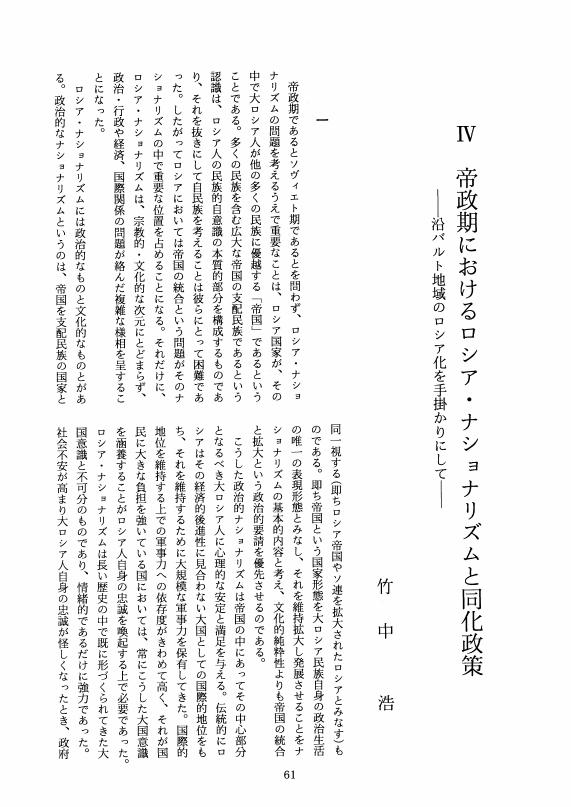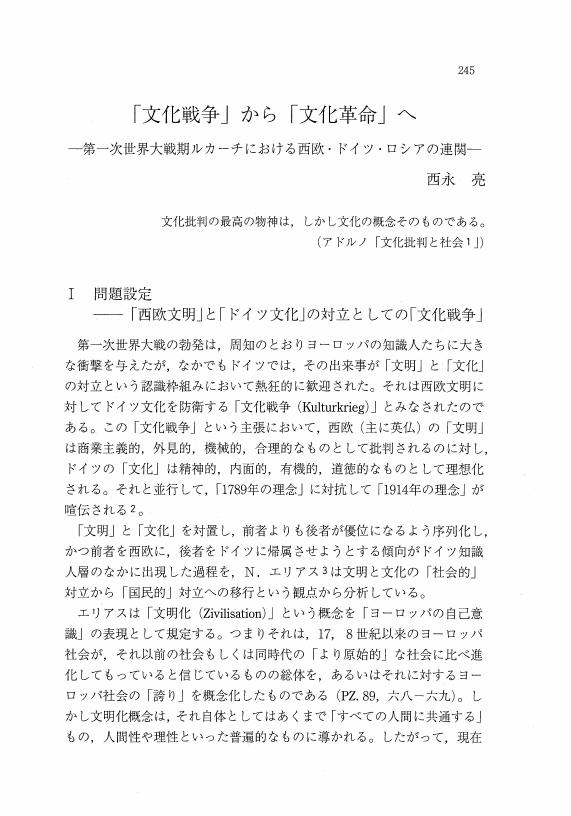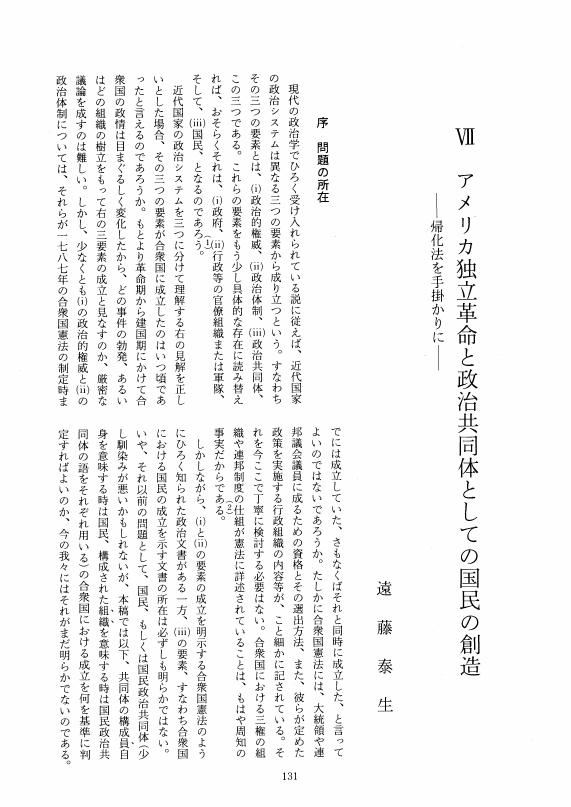1 0 0 0 OA 磁場の政治学
- 著者
- 神島 二郎
- 出版者
- 日本政治学会
- 雑誌
- 年報政治学 (ISSN:05494192)
- 巻号頁・発行日
- vol.27, pp.7-24,en1, 1977-03-31 (Released:2009-12-21)
Until recently in Japan, theories of “domination” (shihai), “conflict” (toso), and “autonomy” (jichi) have been the most utilized conceptual tools in political science research. However, when one applies these theoretical constructs in an attempt to analyze actual political phenomena as they exist in society, there are inevitably things which cannot be adequately explained by these models. In the past, it was often convenient to claim that since we are dealing with a “backward country where cultural standards are lower, one has to expect a certain degree of irrationalism.” I do not believe this explanation is persuasive any longer; rather, the problem is that our conceptual tools are inadequate for understanding Japanese political culture fully.Given this perspective, it is possible to observe from the outset that considerable theoretical confusion persists among these three conceptual tools listed above, and in some instances, extraneous factors have been included. For example, when autonomy is rendered not as self-determination, but as “self-government, ” this is because it has been transformed by the concept of domination. This suggests that it would be valuable not only to distinguish clearly among these three different theoretical constructs, but to abstract from existing reality whatever other tools or theories are necessary for enhancing our understanding. If we were to do this, the following types of theoretical approaches could be developed.Let us list three major concepts: “involution” (kikyo), “assimilation” (doka) and “karma.” These represent three principles which are at the very roots of political culture in Japan, China and India. Since it is a relatively simple matter to identify the basic elements of a particular political culture, one might easily jump to the conclusion that all political cultures can be reduced to a single basic principle. However, this is not the case, and one would be well advised to consider that political cultures are rooted in a series of highly complex principles. Moreover, for each of these principles we can identify seven basic components: ultima ratio (kirifuda), structure, organization, movements, values, change and the social base, and this sheds light on the manner in which these complex elements are intertwined. If we apply these potentially very useful tools to the task of deciphering the reality we perceive around us, the range of our capacity to explain the various existing political and social phenomena which we encounter will be significantly expanded.While political movements are often described as political processes, and political processes are often rendered as developing political conditions, I argue that the overall developmental process of political conditions can be seen as taking a definite form. I call the “place” (ba) in which political conditions develop a fixed “magnetic field” (jiba). We can distinguish three different types of magnetic fields: unipolar, bipolar and multipolar. Moreover, presumably there is some degree of correspondence, between these three types of magnetic fields and the six basic elements that make up society, and with the special characteristics emerging from the way these elements are combined. For example, we can hypothesize that the principles of “karma” and “involution” correspond to the unipolar field; “conflict” and “domination” correspond to the bipolar field; and “assimilation” and “autonomy” correspond to the multipolar field. These elements can be broken down further by distinguishing between the six basic ingredients depending on whether they are diffusive or cohesive, and dividing them into two categories accordingly. It is my hypothesis that if, among the six elements,
1 0 0 0 OA 圧力政治の日本的構造
- 著者
- 永井 陽之助
- 出版者
- 日本政治学会
- 雑誌
- 年報政治学 (ISSN:05494192)
- 巻号頁・発行日
- vol.11, pp.9-29, 1960-05-25 (Released:2009-12-21)
1 0 0 0 OA 日本における比較政治学の発展と展望
- 著者
- 猪口 孝
- 出版者
- 日本政治学会
- 雑誌
- 年報政治学 (ISSN:05494192)
- 巻号頁・発行日
- vol.37, pp.51-68, 1988-01-28 (Released:2009-12-21)
- 著者
- 大嶋 えり子
- 出版者
- 日本政治学会
- 雑誌
- 日本政治學會年報政治學 (ISSN:05494192)
- 巻号頁・発行日
- vol.65, no.1, pp.1_290-1_309, 2014
The memories of French Algeria and the Algerian war of independence had been forgotten by French government for decades. Since the 1990's, however, monuments, laws and speeches began recognising memories related to that period. This article aims to understand why this change occurred. <br> First, we will delve into the French context and examine how the memories of the Holocaust have been connected with those related to Algeria. The 1990's have also been a period during which immigrants became a "problem": the "integration" of immigrants appeared as a solution. <br> Secondly, we will study the case of the Cité Nationale de l'Histoire de l'Immigration, a museum devoted to the past of immigrants. By doing so, we will be able to understand that the recognition of memories does not necessarily involve the recognition of identities and that French government attempts to promote integration by recognising the memories of immigrants.
1 0 0 0 OA 戦後イギリスの議会改革 -下院の衰退と六〇年代以降の改革について-
- 著者
- 犬童 一男
- 出版者
- 日本政治学会
- 雑誌
- 年報政治学 (ISSN:05494192)
- 巻号頁・発行日
- vol.38, pp.31-50, 1988-03-30 (Released:2009-12-21)
1 0 0 0 OA 対外関係の構造変化と外交
- 著者
- 関 寛治
- 出版者
- 日本政治学会
- 雑誌
- 年報政治学 (ISSN:05494192)
- 巻号頁・発行日
- vol.28, pp.63-139, 1979-09-18 (Released:2009-12-21)
1 0 0 0 OA 帝政期におけるロシア・ナショナリズムと同化政策-沿バルト地域のロシア化を手掛かりにして-
- 著者
- 竹中 浩
- 出版者
- 日本政治学会
- 雑誌
- 年報政治学 (ISSN:05494192)
- 巻号頁・発行日
- vol.45, pp.61-77, 1994-12-22 (Released:2009-12-21)
1 0 0 0 OA 政黨研究に關する參考文獻
- 著者
- 中村 菊男
- 出版者
- 日本政治学会
- 雑誌
- 日本政治學會年報政治學 (ISSN:05494192)
- 巻号頁・発行日
- vol.1, pp.103-108, 1950-10-20 (Released:2009-12-21)
1 0 0 0 OA 「文化戦争」から「文化革命」へ
- 著者
- 西永 亮
- 出版者
- 日本政治学会
- 雑誌
- 年報政治学 (ISSN:05494192)
- 巻号頁・発行日
- vol.57, no.1, pp.245-270, 2006-11-10 (Released:2010-04-30)
1 0 0 0 OA コモンズのルールとしての景観条例
- 著者
- 伊藤 修一郎
- 出版者
- 日本政治学会
- 雑誌
- 年報政治学 (ISSN:05494192)
- 巻号頁・発行日
- vol.54, pp.229-244, 2003-12-25 (Released:2009-12-21)
1 0 0 0 1925年中選挙区制導入の背景
- 著者
- 奈良岡 聰智
- 出版者
- 日本政治学会
- 雑誌
- 年報政治学 (ISSN:05494192)
- 巻号頁・発行日
- vol.60, no.1, pp.1_40-1_61, 2009
In 1925 the Law of the election of the Lower House was revised, and the medium-sized constituency system was introduced. This system had been continued for about 70 years and given great influence to Japanese politics. Why and how was the medium-sized constituency system introduced in 1925? The aim of this paper is to answer this question. It has often been said that the three parties in power introduced it in order to escape from competing each other and to keep their base. This is the case, but the background was much more complicated. This paper focuses on three points. First, quite a few medium-sized constituencies had already been made when Hara Cabinet revised the Law of the election of the Lower House in 1919. It reflected wishes of Upper House, which was afraid of Seiyukai's mastery over Lower House, and wishes of some Seiyukai or independent MPs, who were afraid of changes of their constituencies. Second, the small-sized constituency system was greatly criticized among journalism and academic world after World War I. They insisted that corruption in election and higher cost for election was due to the small-sized constituency system, and they were generally welcome to proportional representation and multi party system in Europe. In 1923 Advisory Committee on Law expressed that proportional representation should be adopt. These voices promoted the review of the small-sized constituency system. Third, it was Kenseikai rather than three parties in power that took the initiative in introducing the medium-sized constituency system. Kenseikai did it in order to avoid returning to the large-sized constituency system, which was likely to make excessive multi party system, and to introduce the favorable election system to it. The medium-sized constituency system was favorable for Kenseikai in that it would not lose heavily. Kenseikai aimed to grow as one party in two party system, and the plan really came true after that.
1 0 0 0 結社と民主政治:―アソシエーションから政治は生まれるのか―
- 著者
- 早川 誠
- 出版者
- 日本政治学会
- 雑誌
- 年報政治学 (ISSN:05494192)
- 巻号頁・発行日
- vol.59, no.1, pp.1_61-1_81, 2008
The role of voluntary associations is a focus of current democratic theories including civil society argument, radical democracy, and deliberative democracy. Though it is certain that associations often perform democratic functions, they also disturb democracy by demanding narrow group interests, suppressing the opinions of group members, and lacking the interest in coordination and compromise. Whereas the associationalism developed in the United States depends on voluntary associations excessively; the one in the United Kingdom has been paying a close attention to the inadequacy of associational effects. The legacy of the pluralist theory of the state is especially important in this regard. Comparing two strands of associationalism, it is clear that something is necessary to strike an appropriate balance between the democratic and undemocratic functions of associations. The key to the problem is the new understanding of representative democracy. Contrary to the idea that associatiomalism will eventually replace the state-centered politics, a strong but flexible state which can accommodate and coordinate a variety of associations is required. Without taking such a state into consideration, associationalism would not be able to realize stabilized and impartial democratic politics.
1 0 0 0 地域にとって地域研究者とは何か:地域設定の方法論をめぐる覚書
- 著者
- 山影 進
- 出版者
- 日本政治学会
- 雑誌
- 日本政治學會年報政治學 (ISSN:05494192)
- 巻号頁・発行日
- vol.37, pp.1-25, 1986
1 0 0 0 OA 自民党下野の政治過程 -多元的イモビリスムにおける合理的選択-
- 著者
- 伊藤 光利
- 出版者
- 日本政治学会
- 雑誌
- 年報政治学 (ISSN:05494192)
- 巻号頁・発行日
- vol.47, pp.109-128, 1996-12-10 (Released:2009-12-21)
1 0 0 0 OA 衆議院選挙制度改革の評価と有権者
- 著者
- 山田 真裕
- 出版者
- 日本政治学会
- 雑誌
- 年報政治学 (ISSN:05494192)
- 巻号頁・発行日
- vol.60, no.1, pp.1_62-1_78, 2009 (Released:2013-02-07)
- 参考文献数
- 10
The purpose of this article is to examine the effects of electoral reform and tendency toward Duvergerian equilibrium in the lower house elections in Japan to voters. At first, using aggregate data of voting, we confirm the tendency to the Duvergerian equilibrium at the single-member district level. Next, in order to test the relationship between voter turnout and effective number of candidates (ENC) in the SMDs, we estimate OLS regression. After that, combining calculated the ENCs with survey datasets, we observe voters’ perception about satisfaction to election results, belief to function of election, and external efficacy. Here we have two main findings. The one is the positive relationship between voter turnout and the ENCs at the SMDs. The other is the robustness of the voters’ perceptions to electoral reform and the tendency toward the Duvergerian equilibrium at the SMDs. From these findings, we conclude that Japanese voters do not share so pessimistic views as some critics to current electoral system and bi-partism. Simultaneously, we argue that we should be cautious of abstention and the validity of survey datasets.
1 0 0 0 OA グロティウス-『戦争と平和の法』における平和論の構図-
- 著者
- 小笠原 弘親
- 出版者
- 日本政治学会
- 雑誌
- 年報政治学 (ISSN:05494192)
- 巻号頁・発行日
- vol.43, pp.1-17, 1992-12-22 (Released:2009-12-21)
1 0 0 0 OA T. ホッブズ『リヴァイアサン』におけるプライドと徳
- 著者
- 中神 由美子
- 出版者
- 日本政治学会
- 雑誌
- 年報政治学 (ISSN:05494192)
- 巻号頁・発行日
- vol.60, no.2, pp.2_178-2_202, 2009 (Released:2013-02-07)
In the history of political thought, human pride, a feeling of excellence, linked with desire of honour and reputation, has been a cornerstone for political liberty. However, since sixteenth century many thinkers have attacked pride as vanity. The contemporary studies such as Strauss’ have claimed that Hobbes’ Leviathan used the term in this bad sense. Certainly, Hobbes emphasized equality of human kind and recognized its dangerous side as ‘vain glory’ leading to the civil war. Nevertheless, in his volume, pride can be equated with generosity or self-confidence as a virtue. The passion in a true and good sense is rather the inner feeling of one's own powers based on one's actual merits. For Hobbes, it works as motivation to help to the others, or appears as courage against ‘fear’ in his covenant theory.
- 著者
- 宮地 忠彦
- 出版者
- 日本政治学会
- 雑誌
- 年報政治学 (ISSN:05494192)
- 巻号頁・発行日
- vol.58, no.2, pp.2_163-2_183, 2007
This paper analyzes the Japanese police's "Zendo-shugi" policy to the Korean residents in the late Taisho period. It aimed to ease the discontent of the Korean residents except "Hutei(dangerous)" Koreans. It was influenced mainly by the new policy of the Government-General of Korea after the March First movement and also partly by the new policy of the Japanese police after the Rice Riot and the former colonial bureaucrats and their policy. In rivalry with the judiciaries, the police tried to understand the anti-Japanese sentiment of the Koreans and satisfy them. But it tended to provoke the Koreans' antipathy toward its interference and had a problem that "Zendo" raised the Korean nationalism. And it was difficult for the police to realize the policy because lower-ranking policemen couldn't understand the "Zendo-shugi". And further, as some Korean immigrant workers the police hadn't seen dangerous sometimes resorted to violence, the police had trouble in distinguishing dangerous Koreans from good Koreans
1 0 0 0 OA ベルギーのエスニック紛争と連邦制-一九九三年の連邦制への移行に関する一考察-
- 著者
- 津田 由美子
- 出版者
- 日本政治学会
- 雑誌
- 年報政治学 (ISSN:05494192)
- 巻号頁・発行日
- vol.45, pp.41-60, 1994-12-22 (Released:2009-12-21)
1 0 0 0 OA アメリカ独立革命と政治共同体としての国民の創造
- 著者
- 遠藤 泰生
- 出版者
- 日本政治学会
- 雑誌
- 年報政治学 (ISSN:05494192)
- 巻号頁・発行日
- vol.41, pp.131-149, 1991-08-30 (Released:2009-12-21)











